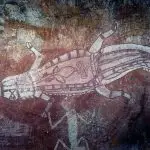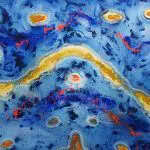Amongst this group of people who lived by the coast with their children, there was this little girl called Min-na-wee. Now Min-na-wee herself, she was a bit different from all the other children in that she would often like to cause trouble amongst the other kids and, of course, this would disrupt the whole camp.
My grandfather actually told me the story when we were sitting beside a creek fishing one day and out of curiosity as a child I asked him why do crocodiles roll when they catch their prey. He then told me the story about his country, which he said his mother had passed on to him.
I grew up with my grandparents-they raised me-and it was fantastic at the time because my grandmother was the sort of person…she certainly taught us how to read and write before going to school which I think is very important and also taught us cooking, sewing and those types of things.
My grandfather on the other hand taught us how to cook kangaroo, for instance, in the ground. He also was the first and only man I ever saw in my life that lit fire rubbing sticks together. I haven’t seen that performed since.
When we went out camping and sometimes we’d forget the matches, he’d do that. He’d light the fire in the traditional way.
But certainly he was a man that could live and hunt off the land. He knew where all the fishing places were, he knew where to get kangaroos from, or turkeys.
The moral of the story about Min-na-wee and the crocodile, it has a couple of meanings for me which I feel is the sort of thing that I’ve stuck pretty close to in my life. Because, actually, when you look deeper into the stories what they’re doing is they’re really telling us how to live life. They’re equivalent to the ten commandments, if you like. There are messages in all the stories. What Min-na-wee told me is that the most important thing is that you should never make trouble in your community, unnecessarily. You should never do that. It’s no good for people. It causes too much heartaches and sorrows amongst people, you know? And what we’re after is we want to bring the people together.
The other thing is if we’re different in some way, well that’s okay. It’s okay to be different. It doesn’t matter as long as you’re happy inside. It doesn’t matter if you look different, if we behave differently than others. As long as we’re doing the right things; we’re not harming people, we’re not harming ourselves.
And it’s all about respecting too. Learning to respect what your Elders are saying, is the other message that comes across in the story too. When the Elders came to Min-na-wee’s mother, Min-na-wee must have known that the Elders came to her mother and her mother would have talked about it to her anyway. And again you have this message that we’ve got to respect what our Elders say.
Our Elders are important to us. They’re the history of our people and they have the stories, they’re the keeper of all this knowledge. So we have to respect the old people and listen to what they say. They don’t say things unnecessarily. They say things because they know that what we might do at times might cause trouble and they can see that happening and they don’t want trouble within the communities too.
I think that’s important for us, as Aboriginal people, to try and record as many of these stories as possible, to maintain and to give our younger people a sense of identity. Of them knowing who they are and, certainly, where we’re going in the future.
People don’t realise it, but every day of their lives people are reconciling with one another. We might go out and sit down and have a yarn to someone-to me that’s reconciling. That’s a form of reconciliation, people are able to sit down and talk to one another and tell each other their own stories as well, because we’ve all got, particularly older people have got a hell of a lot of stories to tell from their lifetime.
My concern is that, once they’re gone, then those stories will be lost. So for me, this is why it’s important that we do start recording our stories and start preserving them. Not only for the culture itself, but also for our children. They need to learn these things too, so that they can get an understanding and start to build and work on forming their own identities. And make them complete people.
(Frank Martin, Broome, Western Australia, 1997)


Leave a Reply